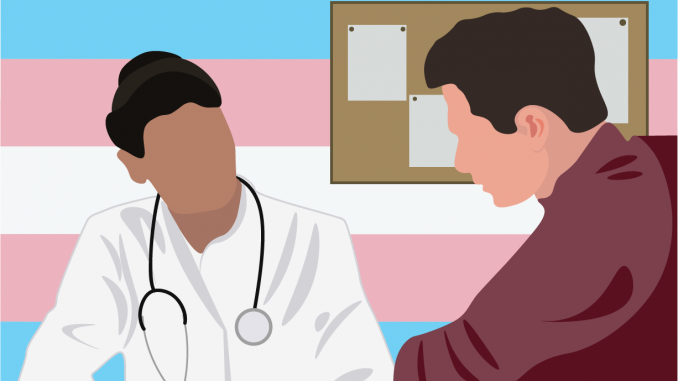
Philadelphia is known as the “City of Brotherly Love,” but we are also renowned for our inclusive, judgment-free LGBTQ health care.
Philadelphia is one of the highest-ranked providers of LGBTQ-friendly medical care in the country, according to the Human Rights Campaign’s 2019 Healthcare Equality Index.
The city earned this recognition by offering inclusive, nondiscriminatory laws and municipal services and training its law enforcement in culturally sensitive topics, according to the City of Philadelphia Action Guide.
In other parts of Pennsylvania and the United States, however, transgender patients oftentimes avoid seeking care because of judgment, fear of being denied care, financial restraints or lack of knowledgeable providers. In a 2017 survey conducted by National Public Radio, 22 percent of transgender respondents said they did not go to a doctor because they were afraid of discrimination.
The commonwealth of Pennsylvania and the U.S. must follow the example Philadelphia has set by introducing statewide and federal transgender-specific programs, increasing its number of providers who specialize in LGBTQ medicine and eliminating all discriminatory insurance and religious exclusions.
Nine states had a negative “policy tally,” or number of laws and policies within the state that promote equality for LGBTQ people, including nondiscrimination, religious exemptions and health care, according to the Transgender Law Center.
Pennsylvania was ranked as “fair,” meaning that outside Philadelphia, transgender patients may still experience health care disparities.
Coleman Terrell, the HIV program director of the AIDS Activity Coordinating Office for the Philadelphia Department of Public Health, has been a fervent advocate for LGBTQ rights since the early 1990s. A member of Act Up, a grassroots organization that brought attention to the AIDS epidemic, Terrell believes the city’s approach is the result of years of perseverance.
“What we have in Philadelphia is driven by the community,” Terrell said. “Nobody gives these things up for free. The strength of the community is why we have what we have. In terms of the city responding, it’s up to the city and the city has done that.”
Philadelphia passed the Fair Practices Ordinance in 1963, which was updated in 1982 and 2002 to include sexual orientation and gender identity respectively. The ordinance protects the LGBTQ community from discrimination in places of public accommodation, like doctor’s offices, according to the city of Philadelphia’s action guide on LGBTQ protections.
The LGBT Equality Bill was passed in 2013 and reinforced protections for transgender people, and in 2014, the city of Philadelphia recognized attacks based on gender identity as hate crimes.
Along with Philadelphia, 41 municipalities in Pennsylvania have passed anti-discrimination laws to protect LGBTQ individuals.
Pennsylvania, however, does not have a statewide mandate prohibiting discrimination based on gender identity in these spaces.
In addition to facing insurance discrimination, transgender patients oftentimes experience stigma in seeking health care. Twenty-four percent reported discrimination, and 50 percent reported difficulty finding a provider who is knowledgeable on LGBTQ-specific needs, according to a 2018 National Institute of Health study.
Nicolle Strand, co-chair of the LGBTQ Alliance Task Force at the Lewis Katz School of Medicine, said providers must take care of transgender patients’ physical and emotional needs.
“We need to make sure that trans patients are called by the names they go by and pronouns they go by throughout the health care system and every encounter,” Strand said.
The Mazzoni Center in Center City is just one of the many health care facilities in Philadelphia that have adopted services specific for transgender individuals, including hormone therapy and monitoring and gender affirmation surgery navigation.
The Children’s Hospital of Philadelphia offers the Gender and Sexuality Development Program that provides psychological and medical support for gender variant, gender expansive and transgender children and youth up to age 21 and their families.
Penn Medicine is one of the few health programs in the nation designated as a “Leader in LGBT Healthcare Equality” by the Human Rights Campaign Foundation. They will launch the LGBT Clinical Practice at Penn Medicine that will provide patient-centered healthcare for the LGBTQ community.
Now, the rest of the state and country must follow Philadelphia’s lead by training their residents and physicians to be culturally competent when using gender-affirming language, creating more inclusive programs and abolishing religious exemptions and discriminatory insurance policies.
With Dr. Rachel Levine now at the helm of President Joe Biden’s Cabinet, hopefully Pennsylvania will allow more transgender individuals to be part of the discussion, said Hansen Bursic, a 2020 film and media arts alumnus who worked closely with Levine on the Pennsylvania Youth Congress, a statewide LGBTQ youth organization.
“Every Pennsylvanian had to turn on the television and watch a trans woman give us medical advice,” Bursic said. “To have a trans person get up on the platform and be a lifeline for an entire state, I know that makes the difference.”


Be the first to comment